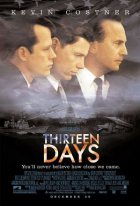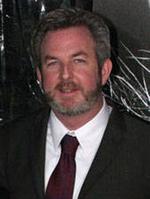
Thirteen Days Page #27
So this is the enemy.
THE WOMAN:
Who are you?
Kenny glances to the door. He considers for a long moment.
KENNY:
The friend.
Kenny breaks the gaze. He begins to whistle again. The
CAMERA drifts away, finding the far DOOR to the inner office,
Kenny's tune stronger, carrying with it hope...
INT. BOBBY'S OFFICE - NIGHT
... to the other side of that DOOR. Dobrynin sits in a chair
opposite Bobby behind his desk. The room is equally dim.
And far more tense.
Silence. And then the FAINTEST STRAIN of O'Donnell Aboo.
Dobrynin glances briefly over his shoulder at the door.
But Bobby, unseen by Dobrynin, can't help the flicker of a
private smile. It's Kenny's presence, and Bobby is the
stronger for it. And then the tune is gone.
Bobby leans forward, cool, controlled, masterful.
BOBBY:
Ambassador Dobrynin, we are aware that
at this moment your missiles in Cuba are
at the brink of operational readiness...
SMASH CUT TO:
EXT. MISSILE SITE - CUBA - CONTINUOUS
Floodlights illuminate MISSILES, vertical on their erectors,
support VEHICLES, clustered across the man-made clearing.
Mask-wearing Technicians wave a FUEL TRUCK back to the
nearest missile. Clouds of toxic VAPOR rise from the others.
They've already been fueled.
BOBBY (V.O.)
They are a vital threat to my country.
If launched, they would kill 80 million
Americans.
SMASH CUT TO:
INT. BOBBY'S OFFICE - CONTINUOUS
Dobrynin listens impassively, as is his professional duty.
BOBBY:
My brother, my friends, my countrymen
and I cannot and will not permit those
missiles to become operational.
(beat)
I promise you that.
Dobrynin looks out the window. And then, pained, looks back
at Bobby.
DOBRYNIN:
Then I fear our two nations will go to
war. And I fear where war will lead us.
Bobby acknowledges him with a nod.
BOBBY:
If the missiles do not become
operational, if you remove the missiles,
then there will be no war.
(beat)
At this moment, the President is
accepting the terms of Secretary
Khruschev's letter of Friday night. If
the Soviet Union halts construction
immediately, removes the missiles, and
submits to U.N. inspection, the United
States will pledge to never invade Cuba
or aid others in that enterprise.
Dobrynin stares at Bobby. Stares hard.
DOBRYNIN:
If your Jupiter missiles in Turkey were
removed also, such an accommodation
could be reached.
The two men move their argument forward with the deliberation
and formality of chess masters.
BOBBY:
(tired sounding)
The United States cannot agree to such
terms under threat. Any belief to the
contrary --
(beat)
-- was in error.
Dobrynin reels internally. The only sign on his face is a
slight tremor. Bobby looks up, registers the calculated
effect. And to Dobrynin's horror, the Russian believes:
DOBRYNIN:
You want war...
But not so fast. Bobby folds his hands. And he smoothly
goes from hard-ass brinksman to sensitive deal-maker.
BOBBY:
However, while there can be no quid pro
quo on this issue, the United States can
offer a private assurance.
Dobrynin holds his breath.
BOBBY (CONT'D)
Our Jupiter missiles in Turkey are
obsolete, and have been scheduled for
withdrawal for some time. This
withdrawal should be completed within,
say, six months.
Dobrynin lets out his breath.
BOBBY (CONT'D)
Of course, any public disclosure of this
assurance would negate the deal and
produce the most stringent denials from
our government.
Dobrynin grasps the move immediately, understanding the
ramifications. Still he hesitates a moment.
DOBRYNIN:
This private assurance represents the
word of the Highest Authority?
BOBBY:
Yes.
DOBRYNIN:
And it can be relayed beyond Comrade
Khruschev's ears to the top circles of
my government
BOBBY:
Of course. Our pledge can be relayed to
any government official Secretary
Khruschev sees fit to satisfy.
Meaning this is the bone he can show the hard line. Dobrynin
struggles internally, knowing what Bobby has done, wanting to
hug him. It comes across as agitation.
BOBBY (CONT'D)
With the caveat that it is not made
public in any way, shape or form.
(beat)
And we must have an answer tomorrow at
the latest. I cannot stress this point
enough.
DOBRYNIN:
Tomorrow...
BOBBY:
Tomorrow...
Dobrynin rises from his chair. Bobby rises with him.
DOBRYNIN:
Then you must excuse me and permit me to
relay the substance of our discussion to
my superiors.
Dobrynin heads for the door. Half way there he turns back to
Bobby, deeply moved. Deeply grateful.
DOBRYNIN (CONT'D)
We have heard stories that some among
your military men wish for war.
(beat)
You are a good man. Your brother is a
good man. I assure you there are other
good men. Let us hope the will of good
men is enough to counter the terrible
strength of this thing which has been
put in motion.
Kenny enters the Oval Office through his side door. The
office is dark, only the desk lamp on. Kenny's gaze moves
over the trappings of power: the carpet with the Presidential
Seal, the rocking chair by the fireplace, the desk.
And on the desk, tucked almost out of sight, sits a small,
humble wooden plaque. It's turned to face the occupant of
the chair behind the desk. Kenny reaches out, turns it
around. It is the Breton's Fisherman's Prayer.
It reads:
OH LORD, THY SEA IS GREAT, MY BOAT SO SMALL.BOBBY (O.S.)
We're out here.
Kenny holds on the plaque a beat, and looks up at the open
French door to the Rose Garden. The curtains swirl around
him in the wind as he goes through the door and out --
EXT. PORTICO - CONTINUOUS
-- onto the portico. Standing there in the dark, by the
white neoclassical pillars of the cloister, are Bobby and the
President. They're holding drinks. Kenny joins them.
The President gestures out across the South Lawn to the
gleaming Washington Monument.
THE PRESIDENT:
We were just debating who had it worse,
us or George Washington and his guys.
BOBBY:
He didn't have to worry about nuclear
weapons.
THE PRESIDENT:
Yeah, but the country didn't even exist
as a country yet. It was a mess, and he
didn't have a leg to stand on.
KENNY:
All he had was his character.
The President and Bobby nod at the justice of that remark.
BOBBY:
How does a guy get a rep like that?
THE PRESIDENT:
Doesn't matter to me. If I went down in
history like Adams, I'd die happy. All
they say about him today is --
KENNY:
-- he kept the peace.
Kenny looks at the President. The President feels it, and
gazes back to him.
The three of them stare out at the glittering city. The
grandness of the world lies before them, and they are
deciding its fate, and are humbled by the awfulness of it.
And for a long moment, they know not to disturb it. There is
nothing left to say. The President, at last, finishes his
drink.
THE PRESIDENT:
You know, we never did control it. Not
really. Not like we think.
He looks at Kenny. Kenny nods. He knows that now too.
THE PRESIDENT (CONT'D)
But we did our best. Now it's up to
them.
Translation
Translate and read this script in other languages:
Select another language:
- - Select -
- 简体中文 (Chinese - Simplified)
- 繁體中文 (Chinese - Traditional)
- Español (Spanish)
- Esperanto (Esperanto)
- 日本語 (Japanese)
- Português (Portuguese)
- Deutsch (German)
- العربية (Arabic)
- Français (French)
- Русский (Russian)
- ಕನ್ನಡ (Kannada)
- 한국어 (Korean)
- עברית (Hebrew)
- Gaeilge (Irish)
- Українська (Ukrainian)
- اردو (Urdu)
- Magyar (Hungarian)
- मानक हिन्दी (Hindi)
- Indonesia (Indonesian)
- Italiano (Italian)
- தமிழ் (Tamil)
- Türkçe (Turkish)
- తెలుగు (Telugu)
- ภาษาไทย (Thai)
- Tiếng Việt (Vietnamese)
- Čeština (Czech)
- Polski (Polish)
- Bahasa Indonesia (Indonesian)
- Românește (Romanian)
- Nederlands (Dutch)
- Ελληνικά (Greek)
- Latinum (Latin)
- Svenska (Swedish)
- Dansk (Danish)
- Suomi (Finnish)
- فارسی (Persian)
- ייִדיש (Yiddish)
- հայերեն (Armenian)
- Norsk (Norwegian)
- English (English)
Citation
Use the citation below to add this screenplay to your bibliography:
Style:MLAChicagoAPA
"Thirteen Days" Scripts.com. STANDS4 LLC, 2025. Web. 5 Feb. 2025. <https://www.scripts.com/script/thirteen_days_316>.







Discuss this script with the community:
Report Comment
We're doing our best to make sure our content is useful, accurate and safe.
If by any chance you spot an inappropriate comment while navigating through our website please use this form to let us know, and we'll take care of it shortly.
Attachment
You need to be logged in to favorite.
Log In